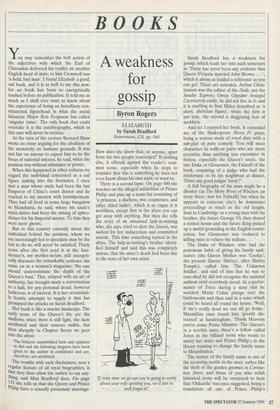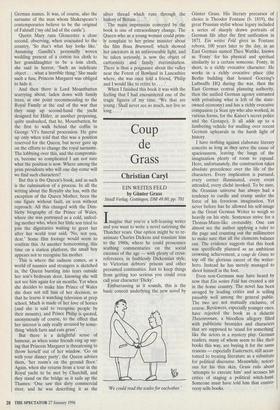BOOKS
A weakness for gossip
Byron Rogers
ELIZABETH by Sarah Bradford Heinemann, £20, pp. 564 You may remember the bolt action of the adjectives with which the Earl of Clarendon delivered his verdict on another English head of state; to him Cromwell was `a bold, bad man'. I found Elizabeth a good, sad book, and it is as well to say this now, for no book has been so energetically trashed before its publication. It told me as much as I shall ever want to know about the experience of being an hereditary con- stitutional figurehead in what the social historian Major Ron Ferguson has called `singular times'. The only book that could overtake it is the autobiography, which in this case will never be written.
At the turn of the century Bernard Shaw wrote an essay arguing for the abolition of the monarchy on humane grounds. It was not fair on anyone to expect him to be the focus of national interest, he said, when the position was without substance or power.
When this happened in other cultures we regard the individual concerned as a sad figure sinking into the footnotes. I once met a man whose uncle had been the last Emperor of China's court doctor and he reacted to my interest with bewilderment. They had all lived in some large bungalow in Manchuria, he said, where his uncle's main duties had been the mixing of aphro- disiacs for his Imperial master. To him they were mere ghosts.
But in this country curiosity about the individual behind the position, whom we are increasingly led to speculate may be the last to do so, will never be satisfied. Thirty Years after she first read it at the hair- dresser's, my mother-in-law, still energeti- cally discusses the remarkable sentence she Came on in a woman's magazine: 'No one should underestimate the depth of the Queen's bust.' This, relayed with an air of authority, has brought many a conversation to a halt, for any personal detail, however ludicrous, is of interest. It is her occasional- ly frantic attempts to supply it that has prompted the attacks on Sarah Bradford.
Her book is like a marine landscape. The early years of the Queen's life are the shallows, when there is still light, the facts attributed and their sources visible, but then abruptly in Chapter Seven we peer into the abyss: The hitherto unpublished facts and opinions in this and the following chapters have been given to the author in confidence and are, therefore, not attributed.
The trouble with such disclaimers, now a regular feature of all royal biographies, is that they then allow the author to say any- thing, and Miss Bradford does. On page 133 she tells us that the Queen and Prince Philip have a sexually passionate marriage. How does she know that, or anyone, apart from the two people concerned? If nothing else, it offends against the reader's com- mon sense, especially when he stops to consider that this is something he does not even know about his own aunt, or want to.
There is a second lapse. On page 400 she touches on the alleged infidelities of Prince Philip and pins up a team list consisting of `a princess, a duchess, two countesses, and other titled ladies', which is so vague it is worthless, except that in the abyss you can get away with anything. But then she tells the story of an unnamed lady-in-waiting who, she says, tried to alert the Queen, was sacked for her indiscretion and committed suicide. This time something turned in the abyss. The lady-in-waiting's brother identi- fied himself and said this was completely untrue, that his sister's death had been due to the state of her own mind.
`If every time we go out you're going to worry about your wife spotting you, we'd just as • well forget it!' Sarah Bradford has a weakness for gossip, which leads her into such sentences as 'There has never been any evidence that Queen Victoria married John Brown . . . which is about as loaded a reference as you can get. There are mistakes. Arthur Chris- tiansen was the editor of the Daily, not the Sunday Express; Owen Glyndwr besieged Caernarvon castle, he did not live in it; and it is startling to find Hitler described as 'a short, plebeian figure', when the first is not true, the second a staggering feat of snobbery.
And yet I enjoyed her book. It reminded me of the Shakespeare Henry IV plays, being a serious study of royal duty with a sub-plot of pure comedy. You will meet characters in walk-on parts who are more eccentric than anything you encounter in fiction, especially the Queen's uncle, the late Duke of Gloucester, the Falstaff of the book, enquiring of a judge who had the misfortune to be his neighbour at dinner, `Done any good judgin' lately?'
A full biography of the man might be a disaster (as The Merry Wives of Windsor, an irony there, was for Falstaff) but when he appears in someone else's he dominates proceedings as much as the old knight. Sent to Cambridge as a young man with his brother, the future George VI, they shared a rented house and the future King picked up a useful grounding in the English consti- tution, but Gloucester was 'reduced to killing mice to relieve the tedium.... '
The Duke of Windsor, who had the poisonous habit of giving his family nick- names (the Queen Mother was 'Cookie', the present Queen 'Shirley', after Shirley Temple), called him 'The Unknown Soldier', and said of him that he was so tone-deaf he did not recognise the national anthem until everybody stood. At a perfor- mance of Tosca during a state visit he watched Maria Callas plunge over the battlements and then said in a voice which could be heard all round the house, 'Well, if she's really dead we can all go home.' Macmillan once found him 'greatly dis- tressed' at Sandringham. 'Thank Heavens you've come Prime Minister. The Queen's in a terrible state; there's a fellow called Jones in the billiard room who wants to marry her sister and Prince Philip's in the library wanting to change the family name to Mountbatten.'
The matter of the family name is one of the recurring motifs in the story, rather like the theft of the garden gnomes in Corona- tion Street, and those of you who relish historical irony will be overjoyed to hear that `Oldcastle' was once suggested, being a translation of one of Prince Philip's German names. It was, of course, also the surname of the man whom Shakespeare's contemporaries believe to be the original of Falstaff (`my old lad of the castle').
Queen Mary runs Gloucester a close second, observing, when evacuated to the country, 'So that's what hay looks like.' Assuming Gandhi's personally woven wedding present of a cotton tea cloth to her granddaughter to be a loin cloth, she said in horror, 'Such an indelicate object . . . what a horrible thing.' She made such a fuss, Princess Margaret was obliged to hide it.
And then there is Lord Mountbatten scurrying about, laden down with family trees, at one point recommending to the Royal Family at the end of the war that they snap up second-hand the yacht designed for Hitler, at another proposing, quite unabashed, that he, Mountbatten, be the first to walk behind the coffin in George VI's funeral procession. He gave up only when told that this was a position reserved for the Queen, but never gave up on the efforts to change the royal surname. The lobbying over this, and the compromis- es, become so complicated I am not sure what the position is now. Where among the prim presidents who will one day come will we find such characters?
But this is the Queen's book, and as such is the culmination of a process. In all the writing about the Royalty she has, with the exception of the Queen Mother, been the one figure without fault, an icon without reproach. All this changed with the Dim- bleby biography of the Prince of Wales, where she was portrayed as a cold, unfeel- ing mother who, when her little son tried to join the dignitaries waiting to greet her after her world tour said, 'No, not you, dear.' Some film footage would seem to confirm this. At another homecoming, this time on a station platform, the small boy appears not to recognise his mother.
This is where the sadness comes, as a world of nannies and strangers is sketched in, the Queen bursting into tears outside her son's bedroom door, knowing she will not see him again for six months. Yet when she decides to make him Prince of Wales she does not tell him of her decision, so that he learns it watching television at prep school. Much is made of her love of horses (and she is said to recognise people by their mounts), and Prince Philip is quoted, anonymously of course, to the effect that her interest is only really aroused by some- thing 'which farts and eats grass'.
But there is a delightful sense of humour, as when some friends ring up say- ing that Princess Margaret is threatening to throw herself out of her window. 'Go on with your dinner party', the Queen advises them, 'her room's on the ground floor.' Again, when she returns from a tour in the Royal yacht to be met by Churchill, and they stand on the bridge as it sails up the Thames: 'One saw this dirty commercial river, and he was describing it as the silver thread which runs through the history of Britain . . .
The main impression conveyed by the book is one of extraordinary change. The Queen who as a young woman could prim- ly complain to her prime minister about the film Beau Brummell, which showed her ancestors in an unfavourable light, and be taken seriously, is now the object of cartoonists and family recrimination. There is thus a poignance about the valley near the Forest of Bowland in Lancashire where, she was once told a friend, 'Philip and I would like to retire to . . .
When I finished this book it was with the feeling that I had encountered one of the tragic figures of my time. 'We that are young / Shall never see so much, nor live so long . . .



























































 Previous page
Previous page